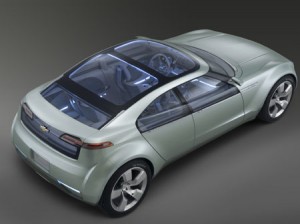 DETROIT: The Chevrolet Volt is the 2011 North American Car of the Year. The winners were revealed Monday morning at a news conference at the North American International Auto Show. The awards are designed to recognize the most outstanding new vehicles of the year. These vehicles are benchmarks in their segments based on factors including innovation, design, safety, handling, driver satisfaction and value for the dollar. The Volt won with 233 points followed by the Hyundai Sonata with 163 and the Nissan Leaf electric with 94. “The Volt seamlessly bridges the gulf between today’s liquid fueling infrastructure and the plugged-in electric future,” commented juror Lindsay Brooke of Automotive Engineering International.
DETROIT: The Chevrolet Volt is the 2011 North American Car of the Year. The winners were revealed Monday morning at a news conference at the North American International Auto Show. The awards are designed to recognize the most outstanding new vehicles of the year. These vehicles are benchmarks in their segments based on factors including innovation, design, safety, handling, driver satisfaction and value for the dollar. The Volt won with 233 points followed by the Hyundai Sonata with 163 and the Nissan Leaf electric with 94. “The Volt seamlessly bridges the gulf between today’s liquid fueling infrastructure and the plugged-in electric future,” commented juror Lindsay Brooke of Automotive Engineering International.
During the 18 years of the awards: Domestic automakers have won North American Car of the Year ten times. European automakers have won four times, Japanese automakers have won three times. A Korean automaker has won once. Last year the North American Car of the Year was the Ford Fusion Hybrid and the North American Truck of the Year was the Ford Transit Connect.
GM reports the Volt can travel 25 to 50 miles solely on electrical power supplied by a lithium-ion battery. The EPA found in tests using varying driving conditions and climate controls that the Volt displaces the Toyota Prius as the most fuel-efficient car sold in the United States.
The Volt’s lithium-ion battery pack can be charged by plugging the car into a residential electrical outlet. No external charging station is required. After the Volt battery is depleted, it switches to extended range mode, when a small 4-cylinder internal combustion engine burns premium gasoline to power a generator supplying the electrical power to extend the Volt’s range. In addition, while in extended range mode and travelling at highway speeds, the engine can engage mechanically via a clutch to combine with the electric motors for propulsion. The electrical power from the generator is sent primarily to the electric motor, with the excess going to the batteries, depending on the state of charge of the battery pack and the power demanded at the wheels.
NPR Reports - Electric Cars Steal The Spotlight At Auto Show

